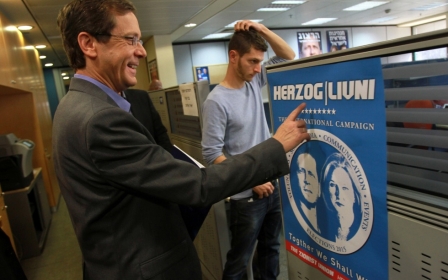Latest Israeli polls show Netanyahu in second place

Prime Minister Benjamin Netanyahu’s right-wing Likud Party has fallen behind in the polls and is now trailing the centre-left Zionist Union coalition by three seats, according to a series of polls conducted ahead of the Israeli elections next week.
On Wednesday, Israel’s Channel Two broadcast the results of its poll which said that the Zionist Union - headed by Isaac Herzog and made up of Labor and former Minister of Justice Tzipi Livni’s Hatnuah party - was likely to win 24 seats out of the Knesset’s 120, putting it two seats ahead of Likud.
In third place was the Joint Arab List - which is made up various parties representing Palestinian citizens of Israel - as well as the ultra-nationalist Jewish Home party, which would both get 13 seats each, the poll said.
Another survey by Israel’s Army Radio similarly indicated that Netanyahu’s party was losing support. The survey found that the centre-left and its potential allies would take 54 seats, compared with 58 for the right-wing and religious parties within the parliament. Smaller parties are tipped for the remaining eight seats who will most likely join up with the centre-left in the formation of coalition government process, denying the right-wing the edge.
The poll results were revealed after weeks in which the Zionist Union and Likud parties were neck and neck.
However, most analysts are still deeming the election too close to call.
Netanyahu has found himself marred in controversy both at home and abroad. Last week Netanyahu addressed US Congress on the threat posed by a nuclear Iran, which was punctuated by frequent standing ovations, but the support was not mirrored back in Israel, with polls suggesting that more than 50 percent of voters disapproved of the move.
Herzog, on the other hand, has been widely mocked for his unassertive personality.
Ari Shavit, a columnist from the Israeli Haaretz newspaper, was quoted by the New York Times as saying: “The great sin of the Israeli centre-left is that it did not produce a towering figure in decades.”
But Herzog has apparently begun to inch ahead in the latest polls. Speaking to Army Radio as part of his campaign, Herzog said he was the only leader “able to replace Netanyahu” although he avoided giving a direct answer to the question of whether he would agree to form a unity government with Netanyahu.
“Wherever I go, they tell me not to go with Bibi [Netanyahu], the ultra-Orthodox, or with the Arab parties,” he said. “But we have to keep in mind Israel’s political map.”
The 17 March elections have thrown the major domestic and international challenges under the spotlight. The Iranian nuclear negotiations, the deadlock in peace efforts, and a looming Palestinian legal move at the International Criminal Court will all have to be tackled. Not to mention the long-running issue of national security for Israelis, on which Netanyahu has placed great emphasis.
“This time you must vote Likud,” Netanyahu wrote on his Facebook page, “because if the gap between Likud and Labor isn’t closed, there is a real danger that Tzipi and [Herzog] will head the next government with the support of the Arab parties.”
Under Israel’s electoral system, the task of forming the next government is taken up by the politician who has the best chance of putting together a coalition government.
Proportional representation means the smaller parties are often well-placed to play king-maker, tipping the balance one way or another.
Middle East Eye propose une couverture et une analyse indépendantes et incomparables du Moyen-Orient, de l’Afrique du Nord et d’autres régions du monde. Pour en savoir plus sur la reprise de ce contenu et les frais qui s’appliquent, veuillez remplir ce formulaire [en anglais]. Pour en savoir plus sur MEE, cliquez ici [en anglais].





